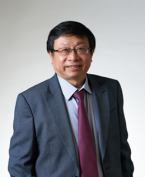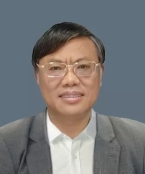
Tokyo, Japan


Tokyo, Japan

Yu HUANG received his BSc from Fudan University Shanghai Medical College and a PhD from University of Cambridge. He served as the Chair Professor of Biomedical Sciences (2010-2021) in Chinese University of Hong Kong until October 2021. He is the Jeanie Hu Professor of Biomedical Sciences, Chair Professor and Head of the Department of Biomedical Sciences at City University of Hong Kong. He is the Vice President of Chinese Section of International Society for Heart Research (ISHR) and Chinese Association for Physiological Sciences. He is an elected Fellow of ISHR, International Union for Physiological Sciences Academy of Physiology, and British Pharmacological Society. He received the Inaugural Hong Kong Research Grants Council - Senior Research Fellow Award (2020). He is the first Chinese scholar to receive the Peter Harris Distinguished Scientist Award from ISHR (2024). He is an Associate Editor of Circulation Research. His team aims to elucidate cellular and molecular events in the initiation and progression of endothelial cell dysfunction in hypertension and diabetes, to uncover novel biomarkers of vascular pathogenesis, and to develop ways to reverse vascular dysfunction in animal models of cardiometabolic disease. He has co-authored 524 SCI publications including Nature, Science, Circulation Research, European Heart Journal, Cell Metabolism, PNAS, Diabetes, Hypertension, Cardiovascular Research, Kidney International etc. with over 37,250 Google scholar citations and an h-index of 99.
Speech titile: "Mechanobiology in Drug Discovery"

Hesham H. Ali is a Professor of Computer Science and the director of the University of Nebraska Omaha (UNO) Bioinformatics Core Facility. He served as the Dean of the College of Information Science and Technology at UNO between 2006 and 2021. He has been a research collaborator at Mayo Clinic Research Hospital since 2022. He has published numerous articles in various computing and informatics fields of research, including scheduling, distributed systems, data analytics, wireless networks, and Bioinformatics. He has published two books in scheduling and graph algorithms, and several book chapters in Bioinformatics. He has been serving as the PI or Co-PI of several projects funded by NSF, NIH and Nebraska Research Initiative in the areas of AI, Bioinformatics, Data Analytics and Wireless Networks. For the last 25 years, he has also been leading a Bioinformatics Research Group that focuses on developing innovative computational approaches to model complex biomedical systems and analyze big bioinformatics data using AI tools, Network models, and graph algorithms. The research group is currently developing next generation data analytics tools for analyzing large heterogeneous biological and health data associated with various biomedical research areas, particularly projects associated with infectious diseases, microbiome studies, early childhood development and aging research. He has led many local and national outreach initiatives, including Bioinformatics training workshops, Women in IT initiatives, IT education and training programs, and IT summer internship camps.odels can leverage the new biomarkers in supporting advanced biomedical research and lead to the next generation of healthcare.
Speech Title: "The Expanding Role of AI-Rich Biomedical Informatics in Supporting Biomedical Research and Advancing Healthcare"
Abstract: The last several years witnessed major advancements in the development of technologies with the goal of collecting various types of data in many application domains. The biomedical domain represents a clear example of such development, since every time the evolving biomedical technologies make it possible for bioscience researchers to have access to new type of biological data, exciting research questions attract new studies: Would it possible for the new data to provide new biological signals, signatures or biomarkers to be used for supporting biomedical research and advancing healthcare? Would the biological signals associated with the new data be robust enough to be used for the purpose of early disease diagnosis or the assessment of different treatments for certain health conditions. In this talk, we provide a brief introduction to biomarkers and how various technologies helped produce biomarkers with major impact on biomedical research and healthcare. We then discuss how recent technologies have made it possible to generate new types of data that can be used to obtain a new generation of biomarkers. We discuss biomarkers obtained from mobile wearable devices, microbiome data, and nanoparticles profiles. We discuss how the exciting new AI tools and network models can leverage the new biomarkers in supporting advanced biomedical research and lead to the next generation of healthcare.

De-Shuang Huang is a Professor/Director in Ningbo Key Laboratory of Multi-Omics & Multimodal Biomedical Data Mining and Computing, Ningbo Institute of Digital Twin, Eastern Institute of Technology, Ningbo, China. He is currently Foreign Academician of Russian Academy of Engineering, the Fellow of the IEEE (IEEE Fellow), the Fellow of the International Association of Pattern Recognition (IAPR Fellow), the Fellow of the Asia-Pacific Artificial Intelligence Association (AAIA), Fellow of the International Artificial Intelligence Industry Alliance (AIIA), and associated editors of IEEE/ACM Transactions on Computational Biology & Bioinformatics and IEEE Transactions on Cognitive and Developmental Systems, etc. He founded the International Conference on Intelligent Computing (ICIC) and the International Conference on Applied Intelligence (ICAI) in 2005 and 2023, respectively. He also served as the 2015 International Joint Conference on Neural Networks (IJCNN2015) General Chair, July12-17, 2015, Killarney, Ireland, the 2014 11th IEEE Computational Intelligence in Bioinformatics and Computational Biology Conference (IEEE-CIBCBC) Program Committee Chair, May 21-24, 2014, Honolulu, USA. He has published over 480 papers in international journals, international conferences proceedings, and book chapters. Particularly, he has published over 260 SCI indexed papers. His Google Scholar citation number is over 25815 times and H index 84. His main research interest includes neural networks, pattern recognition and bioinformatics. His main research interest includes neural networks, pattern recognition and bioinformatics.

Dr. Vincent Quoc-Huy Trinh is an assistant professor at the University of Montreal, staff pathologist at the University of Montreal Health Center, and researcher at the Institute for Research in Immunology and Cancer in Montreal where he also serves as director of the Pathology core. He obtained his medical degree from the University of Montreal and trained as an anatomical pathology resident at the University of Montreal from 2014 to 2019, during which he also completed a Master's in genetics. He was then a GI and liver clinical fellow from 2019-2020 at Vanderbilt University and research instructor from 2020 until 2022 at the same institution with Youngmin Lee, Kathleen DelGiorno and Robert J. Coffey. His research team is focused on the transition of digestive lesions from precursors to invasive using pathology, spatial biology, deep-learning, and mouse models.
Speech Title: "Deciphering Epithelial-Stromal Crosstalk Heterogeneity in Pancreatic Tumorigenesis with Computational Pathology and Spatial Biology"